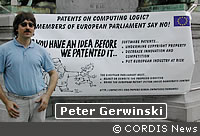Draft legislation on patenting computerised inventions will stifle innovation, claim protestors
On 27 August, proponents of a 'free Europe without software patents' gathered outside the European Parliament to protest against a Commission proposal on the patentability of computer-implemented inventions. The proposal, which will be submitted to European Parliament for plenary debate and a subsequent decision on 1 September, was initially drawn up with a view to eliminating ambiguity in the way software-related patents are handled, and differences in the way EU Member States interpret individual patents. Since then the proposal has passed through three different Parliamentary committees, where MEPS have made amendments with the aim of better defining the type of inventions to be covered by the directive. In particular, the term 'computer-implemented inventions' has been amended so that it does not cover computer software programs as such, but only devices such as mobile phones, intelligent household appliances, engine control devices, machine tools and computer program related inventions. However, those opposing the proposal believe that the amendments do not go far enough and describe the proposed directive as a 'wolf in a sheep's coat'. One of the protestors at the rally, Peter Gerwinski from the Germany based foundation for a free information Infrastructure (FFII) told CORDIS News that the Commission proposal's is deceptive. 'Those that have drawn up the proposal are trying to give the impression that they are forbidding software patents, while in fact they are introducing them.' Dr Gerwinski referred to the first draft of the proposal, which defined the term 'computer-implemented inventions' as 'any invention, the performance of which involves the use of a computer, computer network or other programmable apparatus and having one or more prima facie novel features which are realised wholly or partly by means of a computer program or computer programs.' 'The current draft of the proposal has been amended so the above reference is very well hidden, but the message is the same: Software is patentable,' he argued. Dr Gerwinski is a software developer by profession and runs a software development company in Germany. He strongly believes that the Commission proposal will have dire effects upon innovation and the future of small software companies. 'When patenting of software is introduced in Europe as it is in the US, which is planned in the long run, I will be forced to close down my business and go and work for one of the big players,' speculated Dr Gerwinski. Despite the existing EU directive (91/250/EEC), which excludes software from patentability rules, a total of 30, 000 software patents have already been granted by the European Patent Office (EPO). 'The existing patents are enough to forbid every software I write,' said Dr Gerwinski. 'Very basic techniques like the progress bar have already been patented, meaning that small companies are being squeezed out, leaving bigger companies to monopolise the market'. However, according to MEP Arlene McCarthy from the Parliament's legal affairs committee, the draft legislative resolution takes into account concerns regarding the potential impact on small businesses. One amendment in the draft legislation calls on the Commission to monitor the impact of the legislation on small and medium sized enterprises (SMEs). During the rally, web administrators opposing the draft legislation demonstrated the potential consequences of software patentability by temporarily blocking access to their websites. 'We wanted to show what would happen if a patent owner forbids the use of a specific piece of software - all websites connected to that software would go down,' explained Dr Gerwinski. More than 150,000 people have expressed doubts about the proposal and have signed a petition in support of 'a free Europe without software patents'. Among the supporters are some 2,000 company owners and chief executives, 2,500 developers and engineers from all sectors of the European information and telecommunication industries, as well as more than 2,000 scientists and 180 lawyers. They claim that patents and software do not go together and that copyright is the best solution for protecting the work of those that write software. 'Patenting software is like patenting an onion and then forbidding its use in recipes,' explained Tinne Van Der Straeten, an activist from the Belgian group, the Young Greens. Dr Gerwinski agreed that this illustrates well the illogical nature of the current proposal's objective. His organisation is calling on MEPs to examine the proposed legislation more closely and then read the FFII's comments before casting their vote on 1 September.
Kraje
Germany



